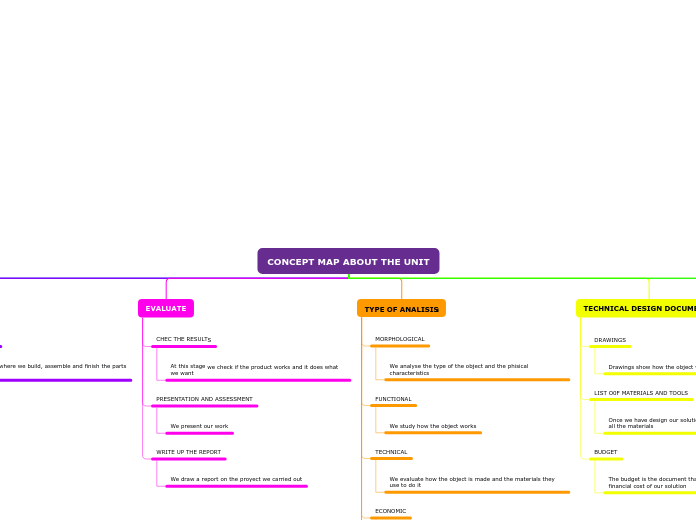CONCEPT MAP ABOUT THE UNIT
ANALISE
DETECT THE PROBLEM
We need to know all the details about the problem
INFORMATION AND RESEARCH
We collate, study and select the information on different ways to know all our possibilities to solve the problem
SEARCH FOR POSSIBLE SOLUTION
Ww thin k on different, options, objects or solutions to solve the problem
CHOOSE THE SOLUTION
we choose the best solutions based on the criteria
DESIGN
DESIGN
We do diagrams and plans for preparing our choosen solution
PREPARE THE PLAN FOR WORK
We choose materiasls, techniques and tools
BUILD
BUILD THE PRODUCT
This is the stage where we build, assemble and finish the parts of the object
EVALUATE
CHEC THE RESULTS
At this stage we check if the product works and it does what we want
PRESENTATION AND ASSESSMENT
We present our work
WRITE UP THE REPORT
We draw a report on the proyect we carried out
TYPE OF ANALISIS^
MORPHOLOGICAL
We analyse the type of the object and the phisical characteristics
FUNCTIONAL
We study how the object works
TECHNICAL
We evaluate how the object is made and the materials they use to do it
ECONOMIC
We anlyse the financtial cost of manufacturing the object
SOCIAL
Social impact, human needs that it meets, environmental impact and recyclability
AESTHETIC
How our senses react to the object
HISTORICAL
Possible reasons why the object emerged, historical development and possible future development
TECHNICAL DESIGN DOCUMENTS
DRAWINGS
Drawings show how the object we are going to build it looks
LIST O0F MATERIALS AND TOOLS
Once we have design our solution, it is very important to list all the materials
BUDGET
The budget is the document that we use to evaluate the financial cost of our solution
INNOVATION
Is a modification made to a product to adapt it to a new conditions
OBSOLENCE
some products have fallen into disuse because they do not have the functionally of the new technologies
PLANNED OSOLENCE
To increase the profits, they made their products to be broken in a specific time. To make people bought more
